English CBSE Class 11 NCERT Hornbill Chapter 1 The Portrait of a Lady Free Solution of Extra Questions and Answers – Extract Based Questions Short Answer Questions Long Answer Questions and Value Based Questions
THE PORTRAIT OF A LADY
(Extra Questions)
Extract Based Questions
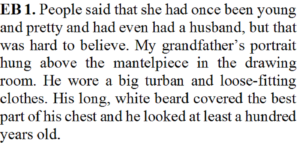

(i) Who is the author of the above extract?
(a) Kushwant Singh
(b) James Harriot
(c)Gordon Cook
((d)Alan east
(ii) Who has been referred as ‘she’ in above extract
(a) sister of the author
(b) mother of the author
(c) grandmother of the author
(d) aunt of the author
(iii) Which word in the extract means ‘picture of face’?
(a) turban
(b) beard
(c) portrait
(d) mantelpiece
(iv) Which of the following has not been depicted in the portrait?
(a) beard
(b) turban
(c) clothes
(d) ornaments
(v) According to the extract, how old did the grandfather look in his portrait?
(a) hundred years
(b) less than hundred years
(c) more than hundred years
(d) none of the above
(vi) Which of the following correctly describes the phrase ‘best part’ as used in the extract?
(a) beautiful portion
(b) major portion
(c) minor portion
(d) front portion
(vii) Was grandfather of the author alive when he wrote this narration?
(a) yes
(b) no
(c) no idea
(d) one cannot know
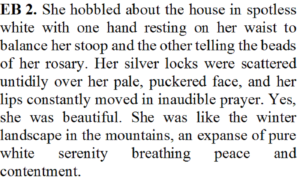

(i) What does the word ‘hobbled’ mean in the above extract?
(a) ran
(b) moved
(c) jumped
(d) relaxed
(ii) What does the phrase ‘silver locks’ mean in above extract
(a) locks made of silver
(b) shining locks
(c) white hair
(d) short hair
(iii) We can infer from the passage that colour of dress of ‘she’ was
(a) blue
(b) rose
(c) scattered
(d) white
(iv) How do you think ‘beads of her rosary’ helping her?
(a) helping her move
(b) helping her become steady
(c) helping her say her prayers
(d) helping her to look old
(v) Which word used in the above extract is synonym of ‘satisfaction”?
(a) serenity
(b) peace
(c) stoop
(d) contentment
(vi) Which figure of speech has been used in ‘She was like the winter landscape in the mountains’?
(a) contrast
(b) synecdoche
(c) simile
(d) anaphora
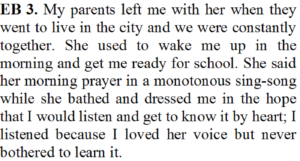

(i) Who is being referred as ‘her’ in above extract
(a) mother of the author
(b) sister of the author
(c) grandmother of the author
(d) mother of the author
(ii) What does the phrase ‘get to know by heart’ mean?
(a) like
(b) memorise
(c) appreciate
(d) despise
(iii) According to extract, which of the following works were done by ‘she’?
- She said her morning prayers
- She sang good songs
- She woke up the author in the morning
- She woke up author in the evening
- She dressed up author
- She hoped that author would learn prayers
(a) 1, 2 and 6
(b) 2, 3 and 5
(c) 1,3, and 6
(d) 4,5 and 6
(iv) Which word in the extract is synonym of ‘unvarying’?
(a) left
(b) monotonous
(c) sing-song
(d) bothered
(v) Author listened to ‘her’ prayers because he
(a) wanted to memorise it
(b) he liked her
(c) he liked her voice
(d) she ordered him to listen
(vi) From which of the chapter above extract has been taken?
(a) Portrait of a Lady
(b) The Adventure
(c) Silk Route
(d) Mother’s Day
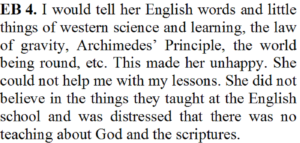

(i) Why grandmother of author could not help author with his lessons?
(a) she did not want to
(b) she did not know the subjects
(c) author did not want her to help him
(d) author did not talk to her
(ii) According to the extract, which of the following were not told by the author to his grandmother
- English words
- French words
- law of gravity
- world being flat
- energy conservation principles
(a) 2,4 and 5
(b) 1,3 and 6
(c) 2,5 and 6
(d) 1, 4 and 6
(iii) Grandmother unhappy with school because of
(a) no teaching about God
(b) no teaching about scriptures
(c) both 1 and 2
(d) none of the above
(iv) According to the extract, what was the medium of instructions in the school?
(a) Hindi
(b) Tamil
(c) English
(d) Malayalam
(v) Which word in the extract is synonym of ‘coached’?
(a) learning
(b) distressed
(c) believe
(d) taught
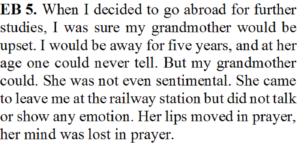

(i) What is meant by the phrase ‘one could never tell.’
(a) author did not want to tell about his destination
(b) author feared his grandmother may die before his return
(c) author was afraid his grandmother
(d) author did not want to leave his grandmother
(ii) Which word in the extract is synonym of ‘higher’?
(a) emotional
(b) even
(c) upset
(d) further
(iii) Why did author think that his grandmother would be upset?
(a) he was going for higher studies
(b) he was going abroad
(c) he was going broke
(d) he was going away for five years
(iv) While coming to railway station, why was the grandmother silent?
(a) she was sentimental
(b) she did not want to show her emotions
(c) she liked being quiet
(d) she was not in talking terms with the author
(v) For what tenure author was going abroad?
(a) four years
(b) three years
(c) fifteen years
(d) five years
(vi) When author returned from overseas, was his grandmother alive?
(a) yes
(b) no
(c) Not mentioned in the extract
(d) None of the above
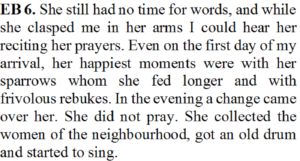

(i) Which of the following is synonym to ‘frivolous rebukes’ as used in the extract?
(a) deep fires
(b) minor scolds
(c) simple jokes
(d) plain talks
(ii) Which of the following are true in respect of activities performed by grandmother
- talked a lot
- recited her prayers
- fed her sparrows
- she prayed in the evening
- she danced in the with women of neigbourhood
(a) 1, 2 and 3
(b) 2,3 and 4
(c) 2 and 3
(d) 4 and 5
(iii) What did grandmother enjoyed most?
(a) saying her prayers
(b) playing her drum
(c) feeding her sparrows
(d) collecting women of neighbourhood
(iv) What was the occasion described in the extract?
(a) arrival of author from village
(b) return of author from abroad
(c) arrival of author in the morning
(d) arrival of author at the railway station
(iv) What can be definitely said about time of arrival of the author?
(a) morning
(b) evening
(c) afternoon
(d) before evening
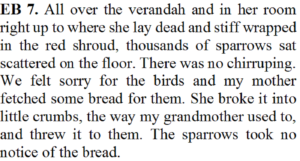

(i) Why birds were not chirruping?
(a) they were dumb
(b) author had ordered them
(c) there was no sound in the room
(d) they had understood the grandmother was dead
(ii) What was colour of the cloth with which grandmother was covered?
(a) green
(b) yellow
(c) red
(d) purple
(iii) In your opinion, why did author’s mother brought some bread?
(a) she thought birds had come to eat bread
(b) she had some extra bread in the house
(c) she wanted to pay homage grandmother
(d) she had done it without any thinking
(iv) Which word in the extract is synonym of ‘spread’?
(a) threw
(b) scattered
(c) wrapped
(d) fetched
(v) Which of the following rightly explains the phrase ‘took no notice of’ as used in the extract?
(a) did not write notice
(b) did not give any direction
(c) did not pay any attention
(d) did not worry
Short Answer Questions (30-40 words)


Answer: She was an old lady who had wrinkles on her face. She was short, fat and slightly bent. She always wore spotless white dress and moved around the house with one hand on her back. Her white hair were carelessly spread and she constantly said her inaudible prayer.


Answer: Author could not believe that his grandfather had a wife or children. He looked so old in his portrait that he could have had only grandchildren.


Answer: The grandmother had white hair that were usually spread across her pale and puckered face. She always wore spotless white dress. She always remained calm. Hence the the author calls her ‘an expense of pure white serenity’.


Answer: The grandmother bathed him and got him ready for the school. She arranged his slate, inkpot and pen. She escorted her to the school and they returned home together. She helped him in doing his home-work.


Answer: In village she used to feed stale chapattis to street dogs. In the city there were no street dogs. So she started feeding sparrows in the courtyard of the house.


Answer: Grandmother used to regularly say her prayers. While being in village, she went to temple every day and read scriptures. She used to feed stray dogs.
She continued her habit of saying prayers in city. She started feeding sparrows in her city house.
Thus she was a religious lady.


Answer: When they moved to city, author started going to an English medium school in a bus. Now grandmother was not able to help him in his homework. Later the author got a separate room for himself. These weakened the friendship.
They were always friends.


Answer: She could not understand teachings of English medium school. She was unhappy that scriptures were not taught there. So she did not like the school.
She thought that music is for harlots and beggars. So she was against music being taught in the school.


Answer: In city house grandmother concentrated more on her prayers. She started spending more time at spinning wheel. She did not talk much to anybody. She started feeding sparrows.


Answer: The author started going to an English medium school in a bus. So there was no need to escort him. She could not help him in his homework. There were no street dogs in the city. Later author shifted to a separate room.
Hence she had to make changes to her routine.


Answer: The author was going abroad for higher studies for five years. Because of her old age, nobody was certain how long more would grandmother live. This is meaning of the sentence.


Answer: She called all women of neighbourhood. She arranged an old drum. She played the drum for several hours and sang songs of warriors coming back to their home. With great persuasion she was stopped to avoid overstraining herself.


Answer: She broke her routine of prayers on the day her grandson returned from abroad.
She was very happy on arrival of her grandson. She played the drum and sang for several hours. In her happiness, she missed saying her prayers.


Answer: Thousands of sparrows came and sat quietly in the verandah and around the grandmother in the room. They did not eat the bread crumbs thrown at them. When the grandmother’s corpse was carried away, they flew away without making any sound.


Answer: Grandmother could not understand English and science being taught in the city school. She was distraught that there was no teaching about God and scripture. She was against music being taught in the school.
In nutshell, grandmother did not approve of the curriculum of the western education.
Long Answer questions (120-150 words)


Answer: During early childhood of author, his parents had shifted from village to city. He stayed in the village with his grandmother. She bathed him, got him ready to school, arranged for his slate, inkpot, pens etc. She escorted him to school and returned together. She helped him in his homework. During this period their friendship was strongest.
Later they both shifted to city. Author was going to an English medium school in a bus. Grandmother did not escort him. Teachings in the schools were not understood by grandmother. Interaction between them reduced.
When author went up to University, he was shifted to another room. This further reduced their interactions. So their friendship further weakened.
However they were emotionally attached to each other. She came to see him off at the railway station. He cherished the moist imprint of kiss by her. She celebrated his return by singing for long hours.


Answer: In village the grandmother was very busy. She used to bathe and get the author ready for school. She arranged her slate, inkpot etc. She escorted him to the school. She read scriptures at the temple. And they both returned together. She used to tell her beads of rosary and say her prayers. She routinely fed street dogs.
In the city she devoted more time to her prayers. She had started spending more time in front of her spinning wheel. She talked less with people. She started feeding sparrows.
In city the author was going to an English school in a bus. She did not escort him. She could not help the author in his homework. When author went up the University, he was allotted a separate room. There were no street dogs in the city. These were the reasons for change in her routine.
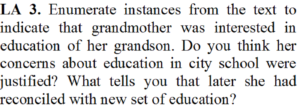

Answer: Grandmother was taking utmost interest in education of author.
While they were in village she bathed him and got him ready in time. She escorted him to the school. She also helped him in doing his homework.
When they moved to city, she continued to make him ready for the school though there was no need to escort him to school. She took interest in his learnings. She could not understand principles and aspects taught in the school Thus she could not help in his homework.
She was not happy that medium of instruction in city school was English. She was also not happy because music was being taught there. I feel this is ill founded. The curriculum of school is decided for overall development of students. They cannot be learning the same aspect throughout their life. Hence her anxiety was not justified.
She had gone to the railway station to see the author off for his higher studies. Thus we can infer that later she had reconciled with new system of education.


Answer: In the text it is mentioned that grandmother was unhappy because education about God and scriptures was not given in the school.
I am of the opinion that her anxiety was justified. Each one of us needs to be taught about our culture. Religion and scripture are part of our culture. Keeping away from such a rich heritage will make us alien within our own country.
Our scriptures are replete with moral stories and fables. We need to emphasise on moral values in our society. School is the best medium to start building an excellent moral character among future leaders.
Such education has become more important after the effect of social media and misuse of internet. Even small build-up of moral values can make a huge positive impact towards a safe society and development of our nation.
****
A PHOTOGRAPH
(Extra Questions)
Extract Based Questions


(i) What is name of the poet of the poem from which the above extract has been taken –
(a) Ted Hughes
(b) Shirley Toulson
(c) Walt Whitman
(d) Kamla Das
Answer: (b)
(ii) What does the word ‘cardboard’ represent in the extract?
(a) a piece of paper
(b) a hard copy
(c) a photograph
(d) a plain paper
Answer: (c)
(iii) How many girls are depicted in the cardboard?
(a) two
(b) three
(c) four
(d) one
Answer: (b)
(iii) Who was the eldest girl in the picture?
(a) author’s cousin
(b) mother’s cousin
(c) author’s mother
(d)cousin’s cousin
Answer: (c)
(iv) The word ‘big’ as used in the extract means
(a) youngest
(b) eldest
(c) shortest
(d) bravest
Answer: (b)
(v) Which poetic devise has been used in second line of the extract?
(a) alliteration
(b) repetition
(c) metaphor
(d) anaphora
Answer: (a)
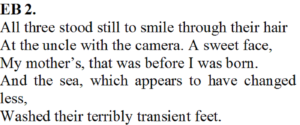

(i) What is the name of the poem through which above extract has been taken?
(a) The Laburnum Top
(b) The Voice of the Rain
(c) A Photograph
(d) Childhood
Answer: (c)
(ii) Which poetic device has been used in the first line of the extract?
(a) alliteration
(b) repetition
(c) metaphor
(d) anaphora
Answer: (a)
(iii) Who had clicked the photograph?
(a) author’s uncle
(b) mother’s uncle
(c) cousin’s uncle
(d) none of the above
Answer: (a)
(iv) What has changed least in the photograph?
(a) sea
(b) mother
(c) cousin
(d) uncle
Answer: (a)
(v) Which word in the extract is antonym of ‘permanent’?
(a) still
(b) terribly
(c) transient
(d) through
Answer: (c)
(vi) Which word in the extract is antonym of ‘ugly’?
(a) stood
(b) still
(c) smile
(d) sweet
Answer: (d)
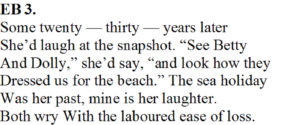

(i) Who are Betty and Dolly?
(a) author’s cousins
(b) uncle’s cousins
(c) mother’s cousins
(d) none of the above
Answer: (c)
(ii) Which word in the extract has been used to mean ‘favourite’?
(a) beach
(b) wry
(c) past
(d) ease
Answer: (c)
(iii) Which poetic device has been used in ‘laboured ease of loss.’?
(a) alliteration
(b) oxymoron
(c) metaphor
(d) anaphora
Answer: (b)
(iv) What is the most enjoyable thing for the author?
(a) holiday at sea
(b) photograph of her mother
(c) laughter of her mother
(d) dressing up for beach
Answer: (c)
(v) Who would laugh at the photograph?
(a) cousin
(b) uncle
(c) mother
(d) author
Answer: (c)
(vi) Which word in the extract mean ‘a few’?
(a) wry
(b) some
(c) how
(d) ease
Answer: (b)


(i) Who has been referred as ‘she’ in the above extract?
(a) author
(b) cousin
(c) mother
(d) uncle
Answer: (c)
(ii) Which poetic device has been used in last line of the sentence?
(a) repetition
(b) oxymoron
(c) alliteration
(d) anaphora
Answer: (c)
(iii) What is meant by ‘There is nothing to say at all.’
(a) poet has nothing to speak
(b) poet has spoken enough
(c) poet has spoken very less
(d) poet has none to speak to
Answer: (d)
(iv) Which word in the extract is synonym of ‘about’?
(a) dead
(b) nearly
(c) many
(d) nothing
Answer: (b)
Short Answer Questions (30-40 words)


Answer: The sea has not changed much but life of human beings has changed a lot. Their preferences have changed. The mother has died and the poet has become middle aged.
Thus poet has impressed that needs, deeds and circumstances of life goes on changing.


Answer: In the photograph shows mother at sea-shore with her cousins Mother used to laugh while looking at the photograph.
Thus we can infer that the mother had enjoyed her childhood. It was full of fun time and family time.


Answer: She was a pretty girl since her childhood. She had enjoyed decent family time during her childhood. She believed in treasuring memories of the past. Her attachment with present is shown by the love of her daughter towards her.
Thus she had balanced past and present.


Answer: It implies that change in the physical or external world happens at a slower rate. But changes in the life of human beings are faster. Our emotions change a lot. One needs to tolerate the loss of near and dear ones.


Answer: The poet is getting nostalgic to recall childhood days of her mother and her own childhood days. They both had enjoyed their favorite pastime and togetherness. The poet is sad that her mother is no longer with her.
.
Long Answer Questions (120-150 words)


Answer: Every living being is mortal. One who has taken birth will surely die some day. Buddha has advised to remain nonchalant even in cases of utter grief.
We would always cherish the memories of our loved ones even after their death. The time spent, the emotional bonding would be in our heart forever.
But we need to remember that the life must go on. We must keep progressing. This can be done only when we have taken every eventuality into our stride. We must remain calm and composed.
Let us remember that we need to transfer good moral and emotional values to next generation. We need to inculcate principles of karma into their life style.
Thus ‘the silence silences’ does not depict the right philosophy of life. The ‘show must go on’ needs to be the guiding principle of life.


Answer: The only constant thing in life is that will change. Right from the beginning of one’s birth, life undergoes several changes. Every stage of life like childhood, middle age and old age brings about its own situations. There are some pleasant moments and some tough situations.
One should adore the happy moments of life. These are treasures of life. These motivate us and propel us to life of karma. Thus we can work ourselves for improvement and remain hopeful about better future.
The circumstances are changing almost every day. Difficult times do not remain forever. We must cherish the pleasant time and use to build a ‘can do’ attitude amongst ourselves. It is our moral responsibility to transmit and inculcate this attitude to next generation.
This paves the way for success and happiness.
****


1 Comment
Bh. V. Sai Srivatsa · October 21, 2021 at 4:56 am
THIS HELPS ME A LOT ….